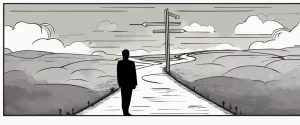The Disappearance of Childhood” by Neil Postman explores the history, development, and consequences of the concept of childhood in society. Postman argues that childhood is a social construct that has been shaped by the introduction of various technologies and forms of media.
The book begins by discussing the origin of childhood in Western civilization and how the introduction of print and the invention of the printing press helped to create a separate realm for children. Postman explores how books and literature came to be seen as essential tools for education and moral development, setting children apart from adults and emphasizing the need for a protected and innocent period of growth.
Postman then examines how this concept of childhood began to erode with the advent of mass media, particularly television. He highlights how television blurred the distinctions between childhood and adulthood by presenting adults and children in similar roles and by exposing children to adult content. Postman argues that this shift in media led to the loss of innocence and a premature exposure to adult themes and values, eroding the traditional boundaries of childhood.
In the later chapters, Postman discusses the impact of digital media and technology on childhood. He argues that the omnipresence of technology has further eliminated the line between childhood and adulthood, as children are now exposed to a vast array of information and adult content readily available on the internet.
Postman concludes by examining the implications of the disappearance of childhood. He suggests that this shift has blurred the distinction between generations, eroded the authority of parents and educators, and altered the dynamics of power and control within society. He also raises concerns about the loss of imagination, play, and the developmental stages of childhood.
Overall, “The Disappearance of Childhood” offers a critical examination of how the concept of childhood has evolved over time and how media and technology have contributed to its erosion. It prompts readers to reflect on the consequences of these changes and raises important questions about the future of childhood in an increasingly digitized and information-saturated world.
The Better Angels of Our Nature” is a comprehensive exploration of the historical decline in violence, authored by cognitive scientist Steven Pinker. Pinker contends that despite the common belief that humans have become increasingly violent over time, our species has actually experienced a significant decline in violence over centuries. He supports this argument by drawing from an array of disciplines, including psychology, sociology, archaeology, and history.
Pinker’s book examines the different forms of violence prevalent throughout history, from prehistoric times to the present day. He delves into the reasons behind these acts of violence, including human nature, culture, and environmental factors. Pinker identifies several key trends that have contributed to the decline in violence. These include the establishment and spread of states and governance, the effects of the Enlightenment era and the rise of reason, the expanding circle of empathy towards others, and the process of globalization.
The author also engages with various critiques against his thesis, addressing alternative interpretations of data and rebuttals from opposing viewpoints. He further discusses the concept of the “inner demons” within humans, the potential for violence within individuals, and the factors that mitigate these tendencies. Pinker also explores the role of the media in shaping public perceptions of violence and argues that our pessimistic view of the world’s condition contradicts the data.
Overall, “The Better Angels of Our Nature” presents a meticulously researched and thought-provoking analysis of the decline in violence throughout history. Pinker challenges conventional wisdom and offers a compelling argument for the idea that humanity has made significant progress in becoming less violent, ultimately providing a more optimistic perspective on the human condition.
Comparison between Two Books
In “The Disappearance of Childhood” by Neil Postman and “The Better Angels of Our Nature” by Steven Pinker, although these two books focus on different aspects of social change, they share some similarities in their analysis. Both Postman and Pinker discuss the impact of societal transformations on human behavior and the notion of progress in different historical contexts.
First, both authors recognize that social change has had a profound effect on the concept of childhood. Postman argues that childhood as a distinct phase of life, with its own unique characteristics, is being eroded in modern society due to various factors such as technology and media. Pinker, on the other hand, examines the decline of violence throughout history and discusses how the changing attitudes towards children and protectionism have contributed to this trend. Ultimately, both authors shed light on the transformation of childhood within their respective contexts.
Secondly, both books explore the idea of progress in the context of social change. Postman points out that with the disappearance of childhood, there is a loss of innocence and a cultural shift towards a more adult-oriented society. He questions whether this transformation is an advancement or a regression. Similarly, Pinker argues that despite the prevalent belief that violence is increasing, there is evidence pointing towards a decline in violence over the centuries. He examines this change in a historical perspective and challenges the narrative of a violent past, emphasizing our progress as a society.
Furthermore, both Postman and Pinker examine the role of technology in shaping social change. Postman explores the impact of television and media on childhood, arguing that the increasing influence of these mediums has blurred the boundaries between childhood and adulthood. Pinker, on the other hand, discusses how technological advancements and increased communications have contributed to the decline of violence by facilitating global cooperation and empathy.
In conclusion, while “The Disappearance of Childhood” by Neil Postman and “The Better Angels of Our Nature” by Steven Pinker approach social change from different angles, they share similarities in their analysis. Both books explore the impact of societal transformations on childhood, discuss the concept of progress, and recognize the role of technology in shaping social change.
Both “The Disappearance of Childhood” by Neil Postman and “The Better Angels of Our Nature” by Steven Pinker discuss social change, but they take different perspectives and focus on different aspects of societal development. Where the books diverge is primarily in their interpretation of the historical trajectory of social change and its implications for humanity.
In “The Disappearance of Childhood,” Neil Postman argues that childhood as a distinct stage of life has diminished and even disappeared due to the influences of media and technology. He suggests that advancements in communication technology, particularly television, have eroded the traditional boundaries between childhood and adulthood. Postman asserts that children are exposed to adult content and ideas from an early age, blurring the lines that once separated them from the adult world. He raises concerns about the loss of innocence and the negative consequences of this blurring, emphasizing the idea that childhood should be protected and nurtured.
On the other hand, “The Better Angels of Our Nature” by Steven Pinker takes a broader perspective on social change throughout history, focusing on the decline of violence and the rise of empathy and reason. Pinker argues that despite the impression of a violent world perpetuated by media and sensationalism, humanity has become less violent and more civilized over time. He analyzes massive datasets from different time periods and regions, showing a decline in violence and an increase in personal security, rights, and empathy. Pinker attributes this long-term trend to the forces of reason, enlightenment, and the development of institutions that protect human rights.
The divergence between these books lies in their interpretations of social change and its effects. While Postman emphasizes the dangers of media and technology on childhood, Pinker highlights the positive aspects of societal progress. Postman’s work focuses on a specific aspect of social change that is the disappearance of childhood, arguing that it threatens the development of young individuals. In contrast, Pinker takes a broader and more optimistic view, looking at how violence and barbarism have decreased over centuries, in support of a more civil and empathetic society.
Overall, “The Disappearance of Childhood” focuses on the consequences of modern media on children, highlighting how it blurs age boundaries. In contrast, “The Better Angels of Our Nature” takes a more optimistic perspective, examining the long-term trends of violence reduction and the rise of empathy in human societies. Both books offer unique insights into social change, but their divergent viewpoints reflect different aspects of social development.




